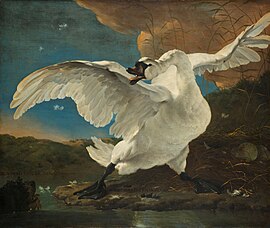The Threatened Swan (Dutch: De bedreigde zwaan)[1] is an oil painting of a mute swan made around 1650 by Dutch Golden Age painter Jan Asselijn. The work is in the collection of the Rijksmuseum in Amsterdam in the Netherlands.[1]
| The Threatened Swan | |
|---|---|
| Dutch: De bedreigde zwaan | |
 | |
| Artist | Jan Asselijn |
| Year | c. 1650 |
| Medium | Oil on canvas |
| Dimensions | 144 cm × 171 cm (57 in × 67 in) |
| Location | Rijksmuseum, Amsterdam, Netherlands |
It is 144 centimetres (57 in) high and 171 centimetres (67 in) wide. The painting's subject is a life-size[2] swan (Cygnus olor) defending its nest against a dog.[1] At the bottom right, the painting is signed with the monogram "A".[3]
By 1800 when it was purchased, the painting was interpreted as a political allegory of grand pensionary (the highest official in Holland, the main province of the Dutch Republic) Johan de Witt protecting the country from its enemies.[1] Three inscriptions had been added: the words "de raad-pensionaris" (the grand pensionary) between the swan's legs, the words "de viand van de staat" (the enemy of the state) above the head of the dog on the left, and the name "Holland" on the egg on the right.[3][4]
Also, based on a recent speculation, it represents Zeus in the story of Leda and the Swan.
In the 1790s this painting was in the collection of Jan Gildemeester and was included in the 1800 catalog of paintings (ordered alphabetically by artist) produced for his estate sale, though it was not included in Adriaan de Lelie's 1794 painting of the collection known as The Art Gallery of Jan Gildemeester Jansz.[5] The catalog states that it is an "allegory of Raadpensionaris de Witt".[4] The painting was purchased by the art dealer Cornelis Sebille Roos for 100 guilders for the Nationale Konst-Gallery in The Hague, on behalf of the director Alexander Gogel.[6][7] It is documented as the first purchase by that institution.[8]
Current speculation is that the white text that was added to the painting in the 1750s during Witten-Oorlog, a pamphlet war between historians.[9] Its painter Jan Asselijn was assumed to have written the words himself until the timeline was brought into question. The Witten-Oorlog, also known as "Witts War" revolved around the 1672 execution of the De Witt brothers, who were Dutch politicians. Jan Asselijn died in 1652.
References
edit- ^ a b c d The Threatened Swan, Jan Asselijn, c. 1650, Rijksmuseum. Retrieved on 6 January 2019.
- ^ van Luttervelt, Remmet, Masterpieces from the Great Dutch Museums: Rijksmuseum, Mauritshuis, Boymans-Van Beuningen, Frans Hals Museum, p. 172, H.N. Abrams, 1961
- ^ a b Bedreigde zwaan; later opgevat als allegorie op Johan de Witt, Netherlands Institute for Art History, 2012. Retrieved on 15 January 2015.
- ^ a b Catalog entry at 1800 purchase for Een Levensgrote Zwaan in een Landschap
- ^ See List of works in the collection of Jan Gildemeester
- ^ Cornelis Sebille Roos in KNAW members list
- ^ "Cornelis Sebille Roos". if then is now. 26 March 2013.
- ^ De Nationale Konst-Gallery en het Koninklijk Museum, Amsterdam by E.W. Moes, 1909
- ^ De inrichting van de Nationale Konst-Gallery in het openingsjaar 1800, by Pieter J.J. van Thiel, Oud Holland, Vol. 95, No. 4 (1981), page 173
External links
editMedia related to The Threatened Swan by Jan Asselijn at Wikimedia Commons
- History of the Rijksmuseum on museum website